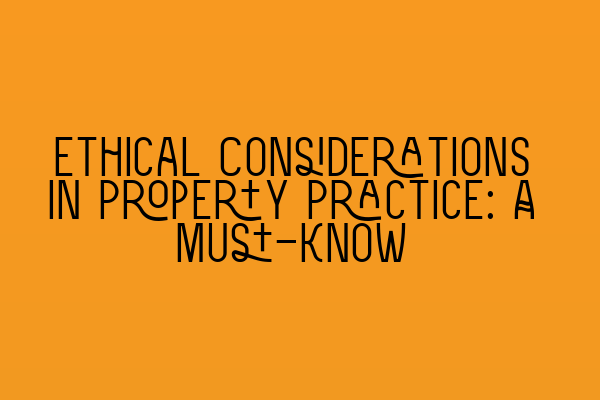Ethical Considerations in Property Practice: A Must-Know
As a property solicitor, it is vital to uphold ethical standards in your practice. Ethical considerations are crucial in maintaining the integrity and professionalism of the legal industry. In this blog post, we will explore the key ethical considerations that property solicitors must be aware of and adhere to. Let’s delve into the world of property law ethics.
The Duty of Confidentiality
Confidentiality is a cornerstone of the legal profession. As a property solicitor, you handle sensitive information about your clients and their property transactions. It is essential that you maintain the strictest level of confidentiality at all times. This means not disclosing any information to third parties without the client’s consent, unless required by law.
By maintaining client confidentiality, you build trust and confidence with your clients. It is important to inform your clients about the duty of confidentiality at the beginning of the solicitor-client relationship. This ensures that they understand the importance of sharing information openly with you, knowing that it will be kept confidential.
For more details on maintaining confidentiality in property practice, you can refer to this SQE 1 Practice Exam Questions article.
Conflict of Interest
A conflict of interest arises when a solicitor’s personal or professional interests conflict with those of their clients. In property practice, conflicts of interest can occur in various situations, such as acting for both the buyer and seller in a transaction or representing clients with conflicting objectives.
It is imperative that property solicitors identify and manage conflicts of interest appropriately. This may involve obtaining informed consent from all parties involved, withdrawing from acting for one or more clients, or referring them to another solicitor to avoid any potential conflicts.
To gain a deeper understanding of conflict of interest scenarios in property practice, you can refer to this SQE 1 Practice Mocks FLK1 FLK2 article.
Honesty and Integrity
Honesty and integrity are fundamental ethical principles that property solicitors must adhere to. You should always provide clients with accurate and honest advice, ensuring that you act in their best interests. Misleading or providing false information to clients is not only unethical but can also have serious legal and professional consequences.
Solicitors must also maintain high levels of integrity in all business dealings. Acting honestly and transparently builds trust with clients, colleagues, and the public. By consistently displaying integrity, you contribute to the positive reputation of the legal profession.
To further enhance your understanding of honesty and integrity in property practice, you can check out this SQE 2 Preparation Courses article.
Professional Competence
Property law is a complex and ever-evolving field. It is vital for property solicitors to stay up-to-date with the latest legal developments, regulations, and best practices. Upholding professional competence means continuously improving your skills and knowledge to provide the best possible service to your clients.
As a property solicitor, you should engage in ongoing professional development, attend relevant training programs, and stay abreast of legal updates. Clients expect their solicitors to possess the necessary expertise and competence to handle their property matters effectively.
For more information on professional competence and how to stay updated in property practice, you can refer to this SQE 1 Preparation Courses article.
Social Responsibilities
Property solicitors have a responsibility to act in the best interests of their clients, but they also have broader social responsibilities. This includes considering the environmental impact of property transactions, assisting disadvantaged clients, and promoting equal access to justice.
Solicitors can contribute to a more sustainable property sector by advising clients on eco-friendly practices, such as energy-efficient renovations or sustainable building materials. Additionally, providing pro bono services or working with charitable organizations helps ensure access to legal representation for those who cannot afford it.
For more insights on social responsibilities and sustainability in property practice, you can explore this SRA SQE Exam Dates article.
Conclusion
Ethical considerations are of utmost importance in property practice. As a property solicitor, maintaining client confidentiality, managing conflicts of interest, upholding honesty and integrity, demonstrating professional competence, and fulfilling social responsibilities are essential to your role. By integrating these ethical principles into your daily practice, you contribute to the integrity and professionalism of the legal industry.
If you have any further queries or would like to enhance your understanding of ethical considerations in property practice, feel free to reach out to SQE Property Law & Land Law. We are here to help you navigate the complex world of property law with professionalism and ethical excellence.
